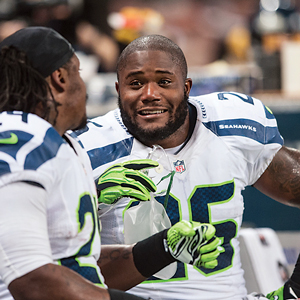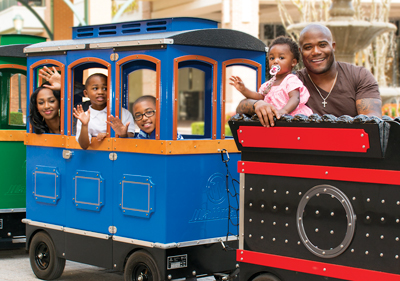 Richmonder Michael Robinson’s journey to the pinnacle of professional football began when he was five. From then on, he found himself on a team striving for excellence.
Richmonder Michael Robinson’s journey to the pinnacle of professional football began when he was five. From then on, he found himself on a team striving for excellence.
The standout student and athlete thrived at Varina High School and Penn State and was drafted by the San Francisco 49ers in 2006. In 2010, he took his talents to Seattle, where he was cut by the Seahawks prior to last season because of health issues related to a reaction to a prescription medication that caused him to drop thirty pounds – not exactly ideal for a fullback in the NFL.
Never one to dodge a challenge, Michael worked hard to get into shape and was resigned mid-season by the eventual Super Bowl XLVIII champions. Now a free agent, the fledgling broadcaster and actor with three academic degrees returned to his hometown earlier this year, settling with his wife, Shameka, and their children in a new home in Glen Allen.
As sunlight filtered into his tidy home office, Michael engaged in a wide-ranging interview that touched on his mentoring program And foundation, which you’ll soon read makes him feel happier and more satisfied than even his Super Bowl win.
The mentoring program, Team Excel, launched in schools this year and has attracted the attention of educators across the state. More than forty schools have expressed interest in implementing the program, which Michael says is loosely modeled on Fantasy Football, to help improve kids’ attitudes, attendance, grades, and goal-setting.
We talked about bullying, his bucket list, changes in the Richmond area, and his thoughts about his sons going pro. A hands-on dad, Michael credited the men who served as his role models for fatherhood. And yes, he even mentioned the Super Bowl.

RFM: Who influenced you the most about wanting to be a good father?
MICHAEL: My real dad [Michael Robinson III] and I have a stepfather [John Ross]. Both of those men played an integral part in how I am as a father. From my real father, who was strung out on drugs, crack cocaine when it hit in the eighties, I think a lot of thirty-somethings have the same story about their fathers or their parents. In the last few years of my life, we have been able to kind of rekindle that relationship. He taught me what not to be. It gave me perspective, it was like, I don’t want to be that. My stepfather came into my life when I was about five years old and he’s been there for me. He’s been my father. He’s been there for my mom every step of the way. He helped me move into my freshman dorm. He taught me how to be a father. He didn’t have any children of his own. My brother and I were his kids and we thank him every time we get a chance.
RFM: What do you think about sports figures being role models?
MICHAEL: I’m not necessarily a role model. I know that’s not the best thing to say. I really, really think the real role models are walking around on the street every day. The mother who is struggling by herself taking care of her two boys, working two or three jobs – that was my mother. She was my hero. I liked Randall Cunningham and Laurence Taylor, but they weren’t my role models. I couldn’t identify with rich guys. I could identify with my mom. She’s from Richmond. She worked hard every day. She put meals on the table. That was my role model. I think most athletes don’t understand that naturally you are going to be a role model. That is how society puts athletes on a pedestal, when it should be that the athletes put the fans on a pedestal. We couldn’t be who we are without the fans. It’s the truth. I look at myself as a mentor. I’m really engaged with the kids I deal with and that’s what makes me happy. People ask me about winning the Super Bowl and ‘Has it hit you, yet?’ I’m like well, I thought I was going to be happier. I thought it would be a dream come true. You know, the Super Bowl is the hottest game in the world and I still felt like something was missing. I still felt like there was a joy I was searching for that I hadn’t found. And I felt like the Super Bowl defines so many people. And I felt like I would have been a champion even if we had lost. I wanted to win and I am thankful that we won, but there was a joy I was looking for that I didn’t quite get when I won the Super Bowl.
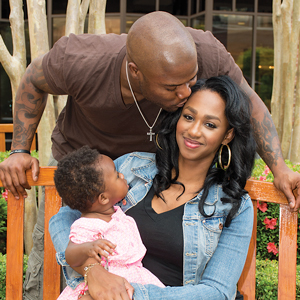 As I came here and started my Team Excel Program with Varina High School and my foundation, I found the joy I was looking for. There are a lot bigger issues that need to be tackled other than sports figures.
As I came here and started my Team Excel Program with Varina High School and my foundation, I found the joy I was looking for. There are a lot bigger issues that need to be tackled other than sports figures.
RFM: As a scholar-athlete with three academic degrees, you excelled in the classroom as well as on the field. When did your love of learning take root and did you ever struggle with being smart versus being cool?
MICHAEL: I think lots of athletes struggle with that. I like to think that when I was there, my group of friends and I made it cool to be smart. I made no qualms about it. I wanted to get up and out of Richmond. I wanted to make a name for myself and be an impactful person. We made it cool because we talked about it. When I talk to young people I just put it out there: Man, I made As in math, I’m happy about that. I’m cool about that. And I get: Ah, man you’re a nerd. And? I got a box full of scholarship letters from many colleges in the country. So we looked at it like that. You are going to come after me for doing what I am supposed to do? That’s what I talk to my kids about. You have to take control of your own life. I hear a Lot of kids saying, ‘My teacher doesn’t like me, my dad isn’t around, or my mom doesn’t do this’… To me, we all have a story, but at the end of the day when you get out of high school and you try to get a job, nobody is going to care that you went through that, because a lot of other people who qualified for the same job had the same excuse. So let’s do away with excuses.
RFM: Is that the message of the mentoring program and the foundation?
MICHAEL: I tell my kids in my Excel to Excellence Foundation, no complaining or moaning. Do what you have to do. My foundation Targets underprivileged kids, which school counselors help to identify [for Team Excel]. Students must sign up; we don’t choose. They have to write essays. We meet in the mornings and it includes speakers from various occupations. We had a guy from Lockheed Martin who’s on my board of directors. He spoke to my kids about building missiles. We went down to meet the general manager of the Flying Squirrels. He took them on a tour and showed them all the different job possibilities. It’s about exposure. We are currently working with thirty students. It’s like reverse Fantasy Football. Myself, Russell Wilson, and Marshawn Lynch – each of us has a team of ten kids and they get points for community service, the highest GPA for the week, and attendance. The highest point winners from each team get prizes like headphones and cameras. It’s an incentive-based thing and we have had forty schools statewide reach out to us and express interest in implementing the program for the 2014-2015 school year.
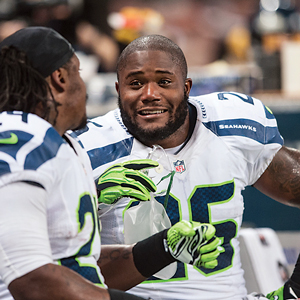
RFM: What are some of the biggest changes you have noticed about the Richmond area now that you are back?
MICHAEL: Short Pump is up and going. When I left Richmond in 2001, there was barely anything out there. They had just finished the mall. I wasn’t even thinking about it when I was growing up. I never went past Virginia Center when I was growing up. It’s weird to see how developed this area is and it is definitely good for the state.
RFM: In high school, did you dream of playing in the NFL and being a Super Bowl champion one day?
MICHAEL: No, I never thought about the Super Bowl. I never looked at the National Football League as the goal or final ending place. Coming up I was always like, what is the next opportunity and challenge? When I played Little League, I wanted to win a championship. When I got to high school, I wanted to play as a freshman on varsity. Man, I was big. [Laughs] As I got older in high school, I wanted to be All-State. To me, it was always about the next level. Growing up, my aspirations were to play for the Miami Hurricanes. That was as far as I thought it went. College was definitely my goal.
RFM: Do you want your children to play professionally? Do they play football now?
MICHAEL: I can’t say that I am pushing them to play football. It’s a very dangerous sport and it can mess you up. If that is something they decide to do, I am a book of answers, so just ask. My boys know that. They have a love of football because of what I do, but I am not pushing them. My 10-year-old is playing ball now. They practice at my old high school, Varina High. He’s very excited about the game. It’s a little too early to see if he’s going to be in the National Football League. As long as he is passionate about something, I am happy about that.
RFM: Given what we know about the long-term impact of concussions, is that a concern of yours?
MICHAEL: Honestly, no. People ask me all the time if I had known how prevalent concussions are during games, would I have still taken the same path in life? And, yes, if me taking a couple years off of my life would better the life of my family…I’m all for that. I wouldn’t do anything different.
RFM: Bullying is a major topic in schools, the workplace, and in sports. How do you address this topic with your children?
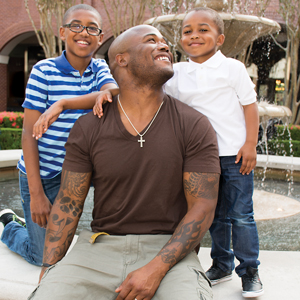 MICHAEL: I tell them you speak up when people are bullying. Most of the times the bully is really not the toughest person. If you stand up for yourself, a lot of times the bullying will stop. I’m not trying to teach putting hands on people; that is not what I am about. But I believe in standing up for yourself. Tell a teacher or tell me. Just make it known. People bully because they are not getting caught.
MICHAEL: I tell them you speak up when people are bullying. Most of the times the bully is really not the toughest person. If you stand up for yourself, a lot of times the bullying will stop. I’m not trying to teach putting hands on people; that is not what I am about. But I believe in standing up for yourself. Tell a teacher or tell me. Just make it known. People bully because they are not getting caught.
RFM: What were the motivating factors that fueled your inspiring comeback from health problems early in the 2013 season?
MICHAEL: One of the biggest reasons why I wanted to come back and play is that I felt like I could still play. I lost some weight, but I didn’t feel like I didn’t want to play anymore. I spent two months out of football at the beginning of the season. I didn’t miss it during the week at all. Monday through Saturday were awesome – the best days ever. But Sunday was hard. I did broadcasting also, so having to objectively talk about these players was difficult for me Knowing that I could go out there and defeat them. Having to objectively talk about Ray Lewis, I will just throw that name out there, on TV when I know I can line up and put him on his back, so that is going to mess up how I am speaking about him. It’s going to come off slanted. I just felt like I was doing myself and the network an injustice, so I told them I didn’t want to do it anymore. I wanted to play football. I got a call from Seattle and they asked me how I felt and I felt awesome. It’s weird going back to a team that has cut you. They made a decision they didn’t need you and now you have to come back and see these people every day. So that was a whole different animal in itself. The biggest motivating factor was just being around those guys in the locker room. Being able to go to war with those guys and just knowing all of the blood, sweat, and tears we’ve been through together. Every guy on the team was calling me every day anyway, it’s not like I was gone. It was just like, we are going to win a Super Bowl! We have to.
RFM: Seattle became Richmond’s team last year. How did it feel to have so many teammates with local and state ties in such prominent roles? [Russell Wilson from Richmond, Percy Harvin from Virginia Beach, Kam Chancellor from Virginia Tech].
MICHAEL: It feels awesome and it’s a true testament to the talent that is here in Virginia. Our state should really start to be compared to California, Texas, and Florida. We have some of the most talented guys in the NFLand the NBA, everybody from Michael Vick to Allen Iverson.
RFM: What’s your dream job after retiring from football?
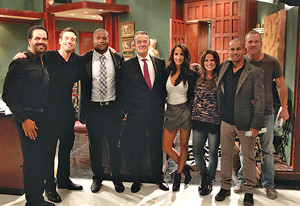
MICHAEL: Leaving the league, I always wanted to have options. So my dream job is to have my own sports lifestyle show where fans get to know the person behind the jersey. Coaching is also an option for me. My dream job would be the head coach at Penn State. I wouldn’t want to go anywhere else. It just depends on what direction I want to go in.
RFM: What’s on your bucket list? Was your appearance on “The Young and the Restless” a few months ago part of it?
MICHAEL: [More laughter] Yes, that was part of my bucket list. Maybe by the time this comes out I will have a recurring role. I go back out to tape in a few weeks. That may be my next job, we’ll see.
My wife made me jump out of a plane a few years ago. That was on my bucket list. Then we actually got up in the air and I didn’t want to do it anymore. I got sick; it was a long day. She had a great time though. She landed fine and everything. I landed on my stomach and got dragged a little bit.
RFM: As a free agent, what are your plans?
MICHAEL: I am a 31-year-old fullback. The league is going to implement a lot more safety precautions. The role of the fullback is getting eliminated. This is all I do all day. There just aren’t that many of us in the league anymore. I think last year there were only nine of us on active rosters. Right now if you are over thirty and a fullback, we are all free agents because we all got cut. For the last four years, myself and Vonta Leach, who was with Baltimore, we’ve been the two best fullbacks in the league and we’re both on the street waiting. It’s just the nature of the game. No matter what happens with the 2014 season, I am extremely excited for the next chapter of my life. We love living in Richmond and being close to family and friends. Right now our priority is to raise our children; it’s all about them and creating an environment for them to succeed.


